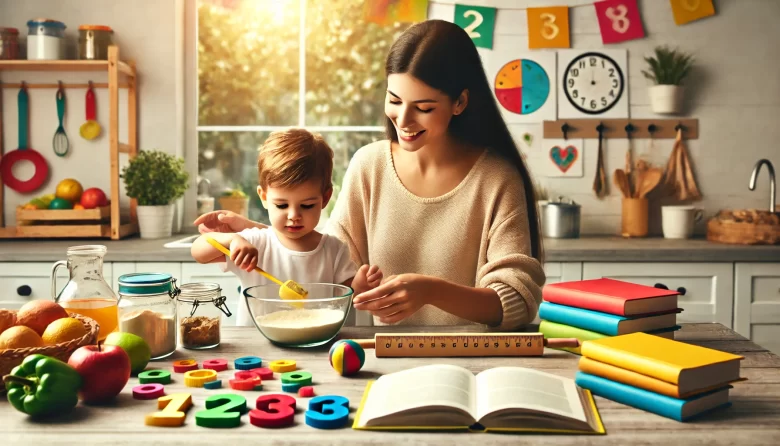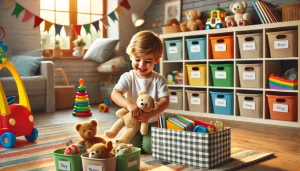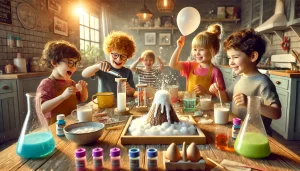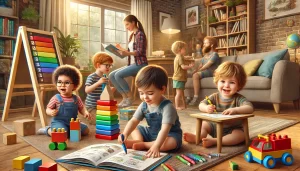Children are naturally curious and eager to learn. As parents or caregivers, we can take advantage of this by transforming everyday tasks into engaging learning opportunities. The home environment is full of activities that can help children develop essential skills, from language and math to problem-solving and creativity. The best part? Learning becomes fun, effortless, and part of daily life.
In this article, we’ll explore practical ways to turn routine tasks into educational moments that will help your child grow and develop while having fun.
Cooking as a Learning Experience
The kitchen is one of the best places for hands-on learning. Cooking together not only strengthens the parent-child bond but also teaches valuable skills.
Math Skills
- Measuring ingredients helps children learn about numbers, fractions, and proportions.
- Counting eggs, cups of flour, or tablespoons of sugar reinforces basic counting and arithmetic.
Science Exploration
- Mixing ingredients and observing changes in texture and color introduces basic chemistry concepts.
- Watching water boil, butter melt, or dough rise in the oven helps children understand heat and transformation.
Language Development
- Reading and following a recipe enhances vocabulary and comprehension skills.
- Talking about textures, tastes, and smells builds descriptive language skills.
Fun Idea: Let your child create their own “restaurant” at home, designing a simple menu, setting the table, and serving family members. This encourages creativity, organization, and social interaction.
Cleaning as an Educational Game
Household chores don’t have to be boring. By turning cleaning into a game, children develop responsibility while practicing important skills.
Sorting and Categorization
- Ask children to separate laundry by color or fabric type, which improves their ability to categorize and recognize patterns.
- Organizing toys by size, shape, or type teaches early math concepts like sorting and sequencing.
Time Management
- Set a timer and challenge your child to complete a task before it runs out. This helps with focus, motivation, and an understanding of time.
- Assign tasks based on difficulty, encouraging children to plan and prioritize.
Fun Idea: Create a “cleaning treasure hunt” where children have to find and put away specific items. Give them clues or riddles to make it more engaging.
Grocery Shopping as a Math and Social Skills Lesson
A trip to the grocery store is full of educational opportunities.
Math Skills
- Have your child add up the cost of items to practice addition and estimation.
- Teach them about money by letting them count change and compare prices.
Language and Reading
- Ask your child to read product labels and find items on a shopping list.
- Discuss different food groups and nutrition to introduce health-related vocabulary.
Decision-Making and Problem-Solving
- Let your child choose between two brands and explain why they made that decision.
- Give them a small budget and let them pick a snack while staying within the limit.
Fun Idea: Turn grocery shopping into a scavenger hunt where children look for specific colors, letters, or numbers on packaging.
Gardening as a Science and Responsibility Lesson
Planting and caring for a garden is an amazing way to teach children patience, responsibility, and environmental awareness.
Science Concepts
- Explain the plant life cycle by showing how seeds grow into plants.
- Discuss the importance of sunlight, water, and soil in plant growth.
Fine Motor Skills
- Digging, planting seeds, and watering plants help improve hand-eye coordination.
- Picking fruits and vegetables strengthens grasp and motor control.
Responsibility and Patience
- Taking care of a plant teaches children about nurturing and responsibility.
- Watching plants grow over time reinforces patience and delayed gratification.
Fun Idea: Let your child have their own small garden plot or pot to care for. Encourage them to decorate plant markers or create a watering schedule.
Laundry as a Hands-On Learning Task
Laundry is a great opportunity for hands-on learning, even for younger children.
Sorting and Categorization
- Have children sort clothes by color, size, or family member, teaching classification skills.
- Match socks together to practice pattern recognition and pairs.
Basic Math and Estimation
- Count how many shirts or socks go into the washer.
- Estimate how long it will take to finish washing and drying.
Life Skills and Independence
- Teach children how to fold clothes, improving fine motor coordination.
- Show them how to check labels for washing instructions, encouraging responsibility.
Fun Idea: Make laundry a “race” by setting a timer for sorting or folding clothes. Reward effort with a fun activity afterward.
Car Rides as an Interactive Learning Session
Even time spent in the car can be an opportunity for learning.
Observation and Awareness
- Play “I Spy” to encourage children to observe their surroundings.
- Ask questions about street signs, landmarks, or different types of vehicles.
Math and Counting
- Count how many red cars, buses, or stoplights you see.
- Read speed limit signs and discuss what the numbers mean.
Storytelling and Imagination
- Create a story together by taking turns adding sentences.
- Ask children to describe where they think other cars are going and why.
Fun Idea: Have a “license plate hunt” where kids look for plates from different states or countries.
Bath Time as a Science and Creativity Session
Bath time can be more than just getting clean—it’s an opportunity to explore concepts like buoyancy, measurement, and creativity.
Basic Science Concepts
- Teach about floating and sinking by testing different toys in the water.
- Discuss water temperature and how it changes when mixed with hot or cold water.
Math and Measurement
- Use measuring cups to pour and compare different amounts of water.
- Count how many scoops it takes to fill a container.
Language and Imagination
- Make up bath-time stories or pretend the bathtub is an ocean.
- Sing songs and practice rhyming words while washing up.
Fun Idea: Add a few drops of food coloring to the water and let children mix colors to see how they change.
Final Thoughts
Turning daily tasks into learning opportunities doesn’t require extra materials or structured lessons. By involving children in everyday activities, we help them develop essential skills naturally, through hands-on experiences.
The key is to make learning feel like play. When children are having fun, they absorb information effortlessly and develop a lifelong love for learning.
So, the next time you’re cooking, cleaning, or running errands, think of how you can turn it into an adventure—one that educates, entertains, and strengthens your bond with your child.




